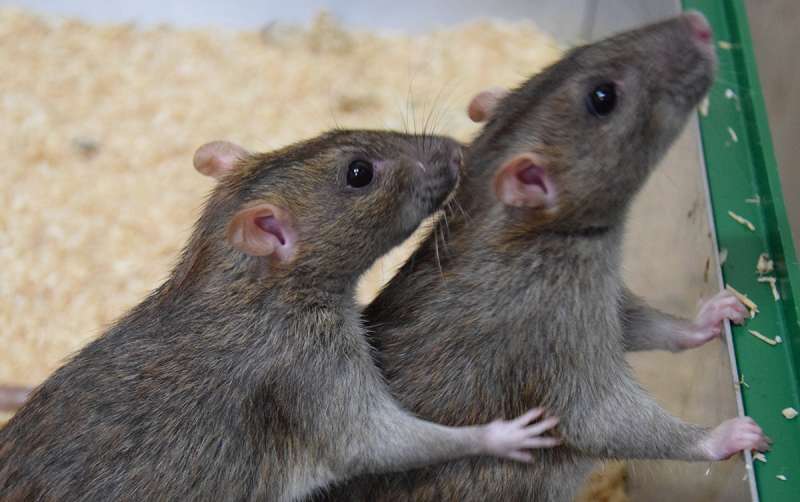Rats help each other out just as humans do

Rats demonstrate cooperative behaviour similar to human beings, researchers at the University of St Andrews have discovered.
When offered food by a partner rat, the common Norway rat was more inclined to engage in grooming with this rat than when no food was received from it and vice versa, according to the research published in Current Biology (February 1).
Dr. Manon Schweinfurth of the School of Psychology and Neuroscience at the University of St Andrews, and Professor Michael Taborksy of the Institute of Ecology and Evolution at the University of Bern, applied saltwater to a rat's neck – a place hard for the rat to reach – to create a situation where help was needed.
To induce food provisioning, partner rats could pull food items towards the other rat. Afterwards, the rats had the opportunity to reciprocate the favour by either grooming the rat which had given them food, or offering food to the rat which had groomed them.
Rats were found to groom cooperative food-providers more often than partners who had refused to help. In addition, rats provided more food to cooperative groomers.
Dr. Schweinfurth said: "We found the rats traded these two services among each other according to the decision rules of direct reciprocity e.g. 'I help you because you helped me'.
"This result indicates that reciprocal trading among non-human animals may be much more widespread than currently assumed. It is not limited to large-brained species with advanced cognitive abilities.
Although a high level of cooperation is a particularly human trait, it is not unique to us. Many animals help each other like bees managing their hive. Human cooperation often follows the reciprocal strategy "I help you because you helped me before". Such reciprocal cooperation has been claimed to be cognitively demanding, especially when different commodities are exchanged.
Trading of different commodities is a fundamental component of human interactions, enabling for instance division of labour, which is the basis of our ecological and economic success. It has been argued that the high cognitive demands of such trading may hamper cooperation in non-human animals.
In contrast, several studies of wild animals have suggested an exchange of different commodities, but until now this has not been discovered under test conditions.
The paper "Reciprocal Trading of Different Commodities in Norway Rats" by Manon K. Schweinfurth and Michael Taborsky is published in the February issue of Current Biology.
More information: Reciprocal Trading of Different Commodities in Norway Rats. Current Biology. DOI: 10.1016/j.cub.2017.12.058 , www.cell.com/current-biology/p … -9822(18)30003-4.pdf
Journal information: Current Biology
Provided by University of St Andrews



















